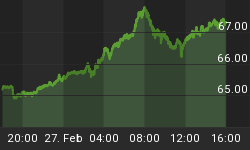It's not the "bad news" from Europe that has been pushing the euro lower
From the May 4 top near $1.4950, the EUR/USD (the euro-dollar exchange rate and the most actively-traded forex pair) has fallen as low as $1.4050 on May 16.
In other words, the dollar has gained 9 full cents on the euro in less than two weeks. That's a huge move, and people want explanations. And what the media offers boils down to "risk aversion," in light of "the bad news from Greece." And that sounds good -- until you check the timeline.
The latest wave of trouble in Europe started on May 3, when Portugal asked for a bailout. If you think that event is what pushed forex traders towards "risk aversion" -- think again. The euro happily gained against the U.S. dollar the following day, May 4, pushing the exchange rate to that high near $1.50.
And if you think the trouble in Greece pushed the EUR/USD lower -- again, please reconsider. Greece made a splash in the news on May 9, when its credit rating was downgraded. But by then the EUR/USD had already fallen some 700 pips, to the mid $1.42 range.
So, as good and logical as all the mainstream stories sound about "risk aversion" and "bad news from Europe," the timing of events doesn't fit. What then gave the dollar the strength -- and at a time when almost everyone expected it to only fall further?
Believe it or not (and it's easy to believe it, because, as this example shows, there's no better explanation) the news doesn't set broad trends in forex. Collective emotions of forex traders do. In early May, the majority was betting against the dollar. When everyone places their bets and there is no new money left to push the price further, it has no choice but to reverse.
That's why it pays to be extra cautious in the financial markets when everyone takes the same side of a trade. True, markets can stay overbought or oversold for a while, but the reversal inevitably comes -- and the stronger the one-sided conviction, the bigger the reversal.
The advantage Elliott wave analysis gives you is this: Wave patterns in forex charts track the collective mindset of the market players. By anticipating the price points where the Elliott wave pattern should end, you get a pretty good idea of where the trend should stop and reverse.
See for yourself how it works -- FREE -- during EWI's Forex FreeWeek now through May 26.
Learn more >>

Don't Miss Forex FreeWeek!
Now through Thursday, May 26 you'll have full and free access to our Intraday Currency Specialty Service. Dig deeper into the forex action with 24-hour-a-day forecasts, charts and analysis for dollar, euro, yen and more.
All you need to access FreeWeek is a FREE Club EWI profile. Set yours up today and don't miss a moment of FreeWeek. Learn more>>
This article was syndicated by Elliott Wave International and was originally published under the headline EUR/USD: Falling on "Risk Aversion"? Let's Look at the Timeline First. EWI is the world's largest market forecasting firm. Its staff of full-time analysts led by Chartered Market Technician Robert Prechter provides 24-hour-a-day market analysis to institutional and private investors around the world.















